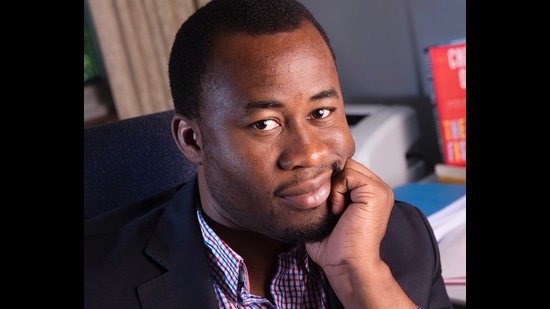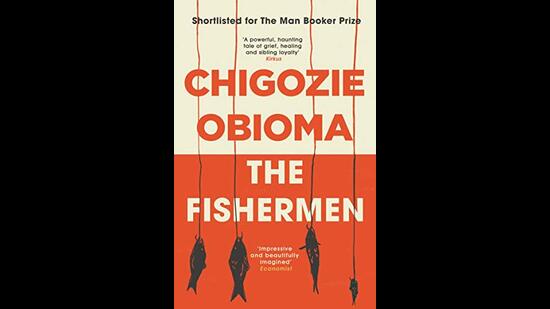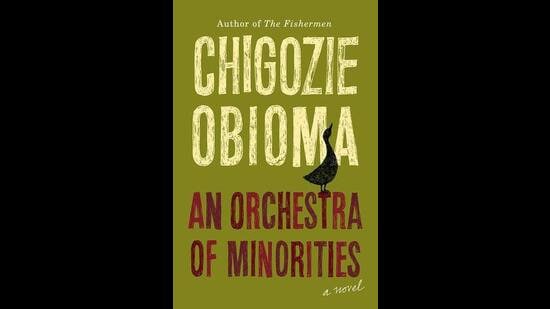Interview: Chigozie Obioma, author, An Orchestra of Minorities – “Writing is a big gamble”
You will be in India soon to speak at the Jaipur Literature Festival
You will be in India soon to speak at the Jaipur Literature Festival. What are you looking forward to? Have you visited India or interacted with your Indian readers before this?

I have always wanted to visit India since 2007 when I had a roommate, Abhinav Bhattacharya, from Assam who would always tell me about India. But even more, India is, to my mind, a singular literary fount that has produced great writers like Salman Rushdie, Arundhati Roy, Anuradha Roy, and others. In fact, Indian readers have been very generous to my work. During the online Jaipur Literature Festival in 2019 and even before then, they have been one of the most fervent supporters of my writing.
Is it true that Indian films are popular in Nigeria? Would you attribute this to cultural similarities? Have you seen any of them?
I grew up watching Indian films. I cannot recall most of them now, but I clearly recall Nagina the Snake Girl (1986). It is considered a classic amongst anyone growing up in Nigeria (and other West African countries) in the 1990s, and we had a VHS copy of it. What I think made them so appealing was the fact that they were different from the American films we were used to seeing and were often authentically Indian. Every movie included actors who seem to also be musicians, and much of the stories were told through music. This was and still is fascinating to me. I do not think Indian films are still as popular as they used to be because of the emergence, and now dominance, of Nigerian movies (“Nollywood”) since the early nineties. But I believe that even that emergence was inspired by the Indian film industry and its reach at the time. That said, every now and then, at cinemas in Lagos and other big cities, you see an Indian film showing.
You have the rare distinction of being a writer in their thirties who has been shortlisted for the Booker Prize twice and served on the Booker jury once. What are some of the factors that have contributed to your success as a writer?
I try to be as honest as I can be when I answer questions, so believe me when I say that I do not know if I have been successful or not. Have my books reached a wide audience? Yes. Have I made some money from them? Certainly. Have I gained some measure of recognition? Without question, yes! But even now, there is still so much work to do that I do not have time to dwell on what the last work has done. I focus immediately on the next, and the struggle to complete something is for me the next challenge. So maybe when I am done with the revision for my third novel, I can feel like I have been successful.
That said, as per work ethic, you’ve got to believe that you have something to say and that you occupy a unique space in the fictional sphere that only you can occupy. This is the only way you can guard yourself against what can sometimes feel like a waste of time, and keep you focused. Focus is the distinguishing factor between a great artist and a struggling one. It is so hard to be focused, to dwell so completely in the universe of a story that nothing else matters, so that you find yourself inhabiting the characters, rather than merely observing the characters. This difference is everything, in my opinion.

How do you feel about having your work translated in over 20 languages? Do you worry about whether a translation does justice to the original? Do you make yourself available if translators want your inputs or feedback?
For me that is one of the greatest joys of writing: being read in different languages, cultures, etc. I always try my best to communicate with the translators, but sometimes they do not even need my help (laughs). I have become good friends with some of them — the French and Norwegian translators for instance.
When is your next novel The Road to the Country scheduled to release? Do you intend to revisit some of the themes that you explored in The Fishermen (2015) and An Orchestra of Minorities (2019)?
Thank you! It will be out in February 2024. We had to move it from 2023 because I have been a bit slow with finishing work on it. This is historical fiction that attempts to recreate the atmosphere and world of Biafra, a country that existed off the coast of the Atlantic Ocean through the eyes of a young man drafted into the Biafran army against his will. It shares affinity with these other novels in that it is taking into its structure, mystical elements that work alongside the historical realism of the story’s plot.
What kind of research did you have to undertake for The Road to the Country, and to what extent does it draw from lived experience?
What a great question! This has been a really taxing undertaking for me. I have read so much stuff, talked with so many people who fought or experienced the war. I have learned so much, and much of it is based indeed on lived experience. But even more, the atmosphere and universe of the story is not a fictional construct, but a historical reconstruction. In fact, the inspiration for the novel came from as far back as 1993, when I was perhaps eight or so and we went from Akure in the West of Nigeria to my homeland in the Eastern region. On getting there, I noticed that many of the people were deformed in some way, something I had not seen at such rapidity in the West. There was a boy who was perhaps in his twenties who had no limbs, a woman whose face had been partly eaten up by cancrum oris. On asking my mother, what happened to these people, she answered: “obu agha,” which means, “the war.” From then on, I knew I was going to write about the war.

What aspects of Igbo culture do you find most nourishing for your creative practice?
I have not really thought about this, but now it seems to me that there is some resilience in tackling big subjects that I cannot easily push out of my mind. It is a universal ideal. Of course, but it has a distinct Igbo spirit to it, especially if you receive its lessons in the context that I received it.
You teach courses in fiction writing and African literature at the University of Nebraska-Lincoln. What do you find most fulfilling and frustrating about being a teacher?
(laughs) Such a balanced question! Teaching creative writing is often like trying to ask a healthy man to stand up straight. They can stand alright, which is not the problem. The problem — or rather — what you want is for them to stand completely straight, and still. This is difficult to do, and most often than not, the person trying to teach students to do this cannot himself stand up completely straight. This is the biggest challenge. I know I have spoken in parables here, but I am really saying that you teach the technical stuff, a sense of how fiction works, the cosmetics effectively, but it is difficult to create that gap in a student’s consciousness from whence the deepest and most profound fictional ideas come if they do not already have it. The other thing is that writing is a big gamble, and you are teaching people to go into this world of gambling and try to win their way through it. It is not easy to do and there are times when you want to ask them to hide their pens and put on a lab coat, but you cannot say such things. You are their teacher!
That said, I believe I would not be the writer that I am today if I did not constantly read other people’s work in progress and sharpen my editorial skills by helping shape their work. It really is something that feeds my own work.
What advice would you give people who love to write and want to publish but do not have the means to pursue an MFA in creative writing?
Do other things, make yourself into a full human being first. Write only if you must, if not, train yourself in doing something else. But if you must write, then read well first. Again, this is if you must write. In writing, do not fall into groupthink. Do not — never — submit to fads. Do not let what is in vogue decide what or how you write. Do not write towards an agenda or to “change” the world: that is propaganda and political punditry, not the stuff of fiction. Write what is honest to you, and even if it may feel as if it is not shiny at first, it will endure. Believe me. And finally, if you need space and time, apply for MFAs. They can help, and you do not need to pay anything. Apply for the Oxbelly Writer’s Retreat that I am launching on January 8, 2023 or come to the University of Nebraska and study with me.
Chintan Girish Modi is a freelance writer, journalist and book reviewer.



